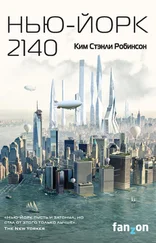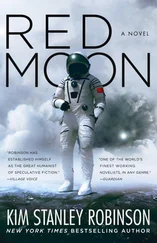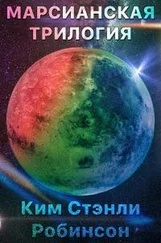Out.
How I hugged that lawyer. He just looked tired. Lucky, he said. Procedural irregularity.
He drove me to a restaurant. Looking out the car window, stunned. Everything looked different. Fragile. Even America is fragile. I didn’t know that before.
At the restaurant we drank coffee.
What will you do? the lawyer said.
I didn’t have the faintest idea. I don’t know, I said. Go to New York and meet my wife’s ship when it comes in. Get cross country to my kid, find some kind of work. Survive.
There was a newspaper on the next table but I couldn’t look at it. Crisis to crisis, we’re too close to the edge, you can feel the slippage in the heat of the air.
And suddenly I was telling him about it, the heat, the barbed wire, the nights in the dorm, the presence of the hospital, the fear, the courage of all those inside. It’s not fair, I said, my voice straining. They shouldn’t be able to do that to them! I seized the newsaper, shook it. They shouldn’t be able to do any of this!
I know, the lawyer said, sipping his coffee and looking at me. But people are afraid. They’re afraid of what’s happening, and they’re afraid of the changes we would have to make to stop it from happening.
But we’ve got to change! I cried.
The lawyer nodded. Do you want to help?
What do you mean?
Do you want to help change things?
Of course I do! Of course, but how? I mean I tried, when I lived in California I tried as hard as I could….
Look, Mr. Barnard, he said. Tom. It takes more than an individual effort. And more than the old institutions. We’ve started an organization here in Washington, DC, so far it’s sort of a multi-issue lobbying group, but essentially we’re trying to start a new political party, something like the Green parties in Europe.
He described what they were doing, what their program was. Change the law of the land, the economic laws, the environmental laws, the relationship between local and global, the laws of property.
Now there’re laws forbidding that kind of change, I said. That’s what they were trying to get me on.
We know. There are people afraid of us, you see. It’s a sign we’re succeeding. But there’s a long way to go. It’s going to be a battle. And we can use all the help we can get. We know what you were doing in California. You could help us. You shouldn’t just go out there and survive, that would be a waste. You should stay here and help.
I stared at him.
Think about it, he said.
So I thought about it. And later I met with some of his colleagues, and talked about this new party, and met more people, and talked some more. And I saw that there is work here that I can do.
I’m going to stay. There’s a job and I’ll take it. Work for Pam, too. Talked to her on the ship-to-shore, and she sounded pleased. A job, after all, and her kind of work. My kind of work.
It didn’t take all that much to convince me, really. Because I have to do something. Not just write a utopia, but fight for it in the real world—I have to, I’m compelled to, and talking with one of the people here late one night I suddenly understood why: because I grew up in utopia, I did. California when I was a child was a child’s paradise, I was healthy, well fed, well clothed, well housed, I went to school and there were libraries with all the world in them and after school I played in orange groves and in Little League and in the band and down at the beach and every day was an adventure, and when I came home my mother and father created a home as solid as rock, the world seemed solid! And it comes to this, do you understand me—I grew up in utopia.
But I didn’t. Not really. Because while I was growing up in my sunny seaside home much of the world was in misery, hungry, sick, living in cardboard shacks, killed by soldiers or their own police. I had been on an island. In a pocket utopia. It was the childhood of someone born into the aristocracy, and understanding that I understood the memory of my childhood differently; but still I know what it was like, I lived it and I know! And everyone should get to know that, not in the particulars, of course, but in the general outline, in the blessing of a happy childhood, in the lifelong sense of security and health.
So I am going to work for that. And if—if! if someday the whole world reaches utopia, then that dream California will become a precursor, a sign of things to come, and my childhood is redeemed. I may never know which it will be, it might not be clear until after we’re dead, but the future will judge us! They will look back and judge us, as aristocrats’ refuge or emerging utopia, and I want utopia, I want that redemption and so I’m going to stay here and fight for it, because I was there and I lived it and I know. It was a perfect childhood.
* * *
Kevin was working at Oscar’s place when he heard the news. He was up on the roof finishing the seal and trim around the bedroom skylights, and Pedro, Ramona’s father, came zooming up on his hill bike, skidding to a stop on the sidewalk. “Kevin?” he called.
“Yeah, Pedro! What’s up?”
Serious look, hands on hips. “Get down here, I’ve got bad news.”
Kevin hustled down the ladder, heart thumping, thinking something’s happened to her, she’s hurt and wants me there.
“It’s Tom,” Pedro said as he reached the ground. Kevin’s heart leaped in a different direction. Just the look on Pedro’s face told him. Deep furrow between his eyebrows. He grasped Kevin’s upper arm. “Their ship was wrecked in a storm, and Tom—he was washed overboard.”
“He what?”
It took some explaining, and Pedro didn’t have all the particulars. Gradually it dawned on Kevin that they didn’t matter. Killed by a storm. Lost at sea. Details didn’t matter.
He sat on a workhorse. Oscar’s front yard was cluttered with their stuff, dusty in the sun. He couldn’t believe it.
“I thought ships didn’t sink these days.” Proud Ganesh flying away from Newport’s jetties.
“It didn’t really sink, but a lot of compartments flooded, and they judged it safer to get out into the lifeboats in case it did sink. It’s still out there wrecked, dead in the water. I guess it was a typhoon, and they got hit by a load of lumber, tore the ship all up.”
Pedro was holding his arm again. Looking up Kevin saw on his face the strain of telling him, the bunched jaw muscles. He looked as much like Ramona as a short gray-haired sixty-year-old man could, and suddenly a spasm of grief arrowed through Kevin’s numbness. “Thanks for telling me.” Pedro just shook his head. Kevin swallowed. From his Adam’s apple down he was numb. He still had a putty knife in his hand. It was Pedro’s kindness he felt most, it was that that would make him weep. He stared at the dirt, feeling the hand on his arm.
Pedro left.
He stood in Oscar’s yard, looking around. Working alone this afternoon. Was that better or worse? He couldn’t decide. He was a lot more solitary than he used to be. He climbed back onto the roof, returned to work on the trim around the skylights. Putty. He sat on the roof, stared at it. When he was a kid he and Tom had hiked in the hills together, sun just up and birds in the trees. Bushwhacking while Tom claimed to be on an animal trail. They’d get lost and Kevin would say, “Animal trail, right Grandpa?” Seven years old and Tom laughing like crazy. Once Kevin tripped and skinned both knees bad and he was about to scream when Tom grabbed him up and exclaimed like it was a great deed, an extraordinary opportunity, and pulled up his own pantlegs to reveal the scars on his knees, then had taken out his Swiss army knife and nicked a scar on each knee, touched their four wounds together and then actually sucked blood from Kevin’s shins, which had shocked Kevin, and spit it in four directions rattling out the nonsense words of an ancient Indian blood oath, until Kevin was strutting around glowing with pride at his stinging knees, badge of the highest distinction, mark of manhood and oneness with the hills.
Читать дальше
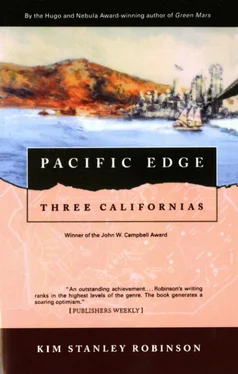
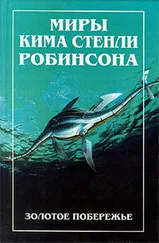
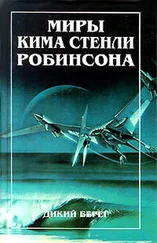

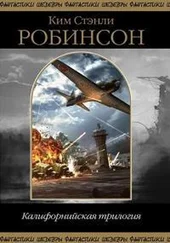
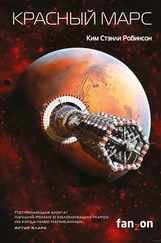

![Ким Робинсон - Годы риса и соли [litres]](/books/394367/kim-robinson-gody-risa-i-soli-litres-thumb.webp)
